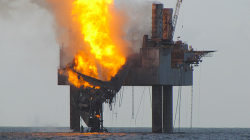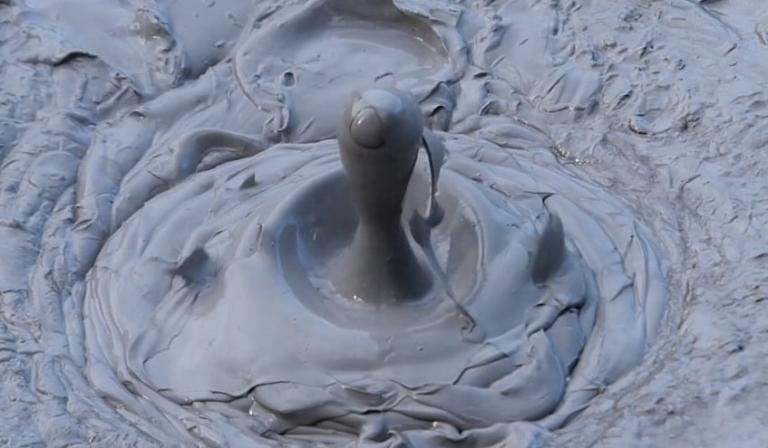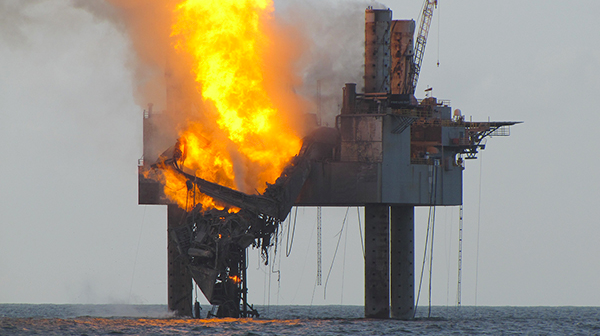
Coast Guard via gCaptainThe Hercules rig ablaze before the flames were snuffed out.
You’ll never guess who spent the past several years arguing that the Obama administration should back off from its regulatory oversight of oil and gas drillers.
That would be James Noe, executive vice president of Hercules Offshore, Inc., which was operating a gas-drilling rig when it blew out and caught fire off the coast of Louisiana on Tuesday. It was just luck that the rig stopped burning on Thursday — sand and sediment plugged up the well hole, blocking the flow of leaking natural gas that had fueled the blaze.
[Noe] also is executive director of the Shallow Water Energy Security Coalition, an advocacy group that just three months ago issued a statement that suggested regulators were being too tough on the industry. The group is comprised of exploration and development companies, drilling contractors and service companies.
“Ramping up the issuance of incidents of non-compliance for often trivial infractions is no substitute for technically substantive oversight – and threatens to take our eye off the ball on what is really important: what’s going on at the drill floor and in the well,” the group said in April.
The statement takes on new relevance now.
Nobody knows quite what went wrong on Tuesday, though investigations are underway. But the accident is already prompting renewed calls for stricter regulations on the companies that tap the Gulf of Mexico for its petrochemical goodies, from Sen. Ed Markey (D-Mass.), among others. “Three years after the BP disaster in the Gulf, there are still too many incidents that threaten workers, the environment, and our economy,” Markey said.
Unlike the Deepwater Horizon blowout, which happened at a water depth of about 5,000 feet, this week’s blowout happened in shallow coastal waters, just 155 feet deep. Again from Fuel Fix:
“It will be interesting to see when the investigation is done what the root cause was and what really happened here, and if it involved a regulation or not,” said Charlie Williams, executive director of the Center for Offshore Safety, an industry organization. The Center has advocated for a safety system that encourages participation rather than penalizes non-participation.
Others say that the danger of shallow water drilling has been overshadowed by the specter of another deepwater Macondo-style spill.
“There is an awful lot of attention on deep water, but there has been a higher blowout rate on the shelf,” [former federal regulator Bud] Danenberger said, referring to the region of shallower water in the Gulf of Mexico. “You can’t forget about the shelf, where the wells are so prolific.”
“The lesson is that Macondo was not a deep-water problem per se. It was a management problem,” Danenberger added. “The blowout rate is historically higher on the shelf, and we need to address all blowout issues, regardless of where they occur.”
Meanwhile, federal regulators involved in managing the blowout and fire — the Bureau of Safety and Environmental Enforcement — have been criticized for withholding information from the public about the accident. From gCaptain, a prominent maritime blog:
BSEE undoubtably took dozens of images and video of the burning well yesterday … but they only released one. Why?
Images of burning rigs invokes a LOT of scrutiny not only of those who operate the rigs, but also those who regulate them. BSEE clearly didn’t want the scrutiny so they kept the industry media in the dark and gave them only what they wanted to tell them. Everything was vetted. …
BSEE noted that one of the vessels was spraying a “water curtain” at the burning rig. ”A water curtain’s purpose is not to extinguish the fire, but to provide heat protection to the rig,” noted BSEE.
That’s interesting because our sources have told us that the ships couldn’t come within 100 yards of the rig due to the overwhelming heat being generated by the blaze. How do you throw a water curtain from 100 yards away?
You don’t. BSEE was trying to tell us that they were doing something, but in reality, nothing useful at all was being done, or could be done.
Lastly, for all you day traders out there, at least one market watcher recommends buying Hercules Offshore stock, saying the company is probably “highly protected from any potential liability.”




